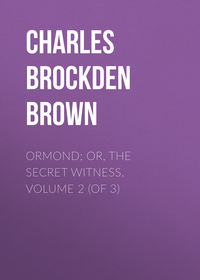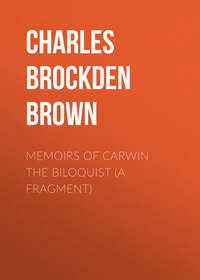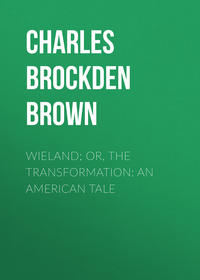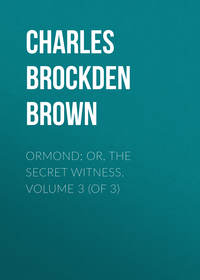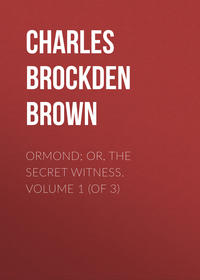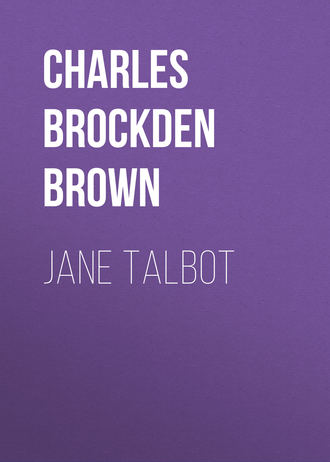 полная версия
полная версияJane Talbot
I cannot be pleased with the information which you give me. For the sake of my friend, I am grieved that you are determined to make her marriage with me the forfeiture of that provision which your bounty has hitherto supplied her.
Forgive me if I say that, in exacting this forfeiture, you will not be consistent with yourself. On her marriage with me, she will stand in much more need of your bounty than at present, and her merits, however slender you may deem them, will then be, at least, not less than they now are.
If there were any methods by which I might be prevented from sharing in gifts bestowed upon my wife, I would eagerly concur in them.
I fully believe that your motive in giving me this timely warning was a generous one. Yet, in justice to myself and your daughter, I must observe that the warning was superfluous, since Jane never concealed from me the true state of her affairs, and since I never imagined you would honour with your gifts a marriage contracted against your will.
Well do I know the influence of early indulgences. Your daughter is a strong example of that influence; nor will her union with me, if by that union she forfeit your favour, be any thing more than a choice among evils all of which are heavy.
My own education and experience sufficiently testify the importance of riches, and I should be the last to despise or depreciate their value. Still, much as habit has endeared to me the goods of fortune, I am far from setting them above all other goods.
You offer me madam, a large alms. Valuable to me as that sum is, and eagerly as I would accept it in any other circumstances, yet at present I must, however reluctantly, decline it. A voyage to Europe and such a sum, if your daughter's happiness were not in question, would be the utmost bound of my wishes.
Shall I be able to compensate her? you ask.
No, indeed, madam; I am far from deeming myself qualified to compensate her for the loss of property, reputation, and friends. I aspire to nothing but to console her under that loss, and to husband as frugally as I can those few meagre remnants of happiness which shall be left to us.
I have seen your late letter to her. I should be less than man if I were not greatly grieved at the contents; yet, madam, I am not cast down below the hope of convincing you that the charge made against your daughter is false. You could not do otherwise than believe it. It is for us to show you by what means you, and probably Talbot himself, have been deceived.
To suffer your charge to pass for a moment uncontradicted would be unjust not more to ourselves than to you. The mere denial will not and ought not to change your opinion. It may even tend to raise higher the acrimony of your aversion to me. It must ever be irksome to a generous spirit to deny, without the power of disproving; but a tacit admission of the charge would be unworthy of those who know themselves innocent.
Beseeching your favourable thoughts, and grateful for the good which, but for the interference of higher duties, your heart would prompt you to give and mine would not scruple to accept, I am, &c.
HENRY COLDEN.
Letter XXIV
To Henry ColdenPhiladelphia, Nov. 2.
Ah, my friend, how mortifying are those proofs of thy excellence? How deep is that debasement into which I am sunk, when I compare myself with thee!
It cannot be want of love that makes thee so easily give me up. My feeble and jealous heart is ever prone to suspect; yet I ought at length to be above these ungenerous surmises.
My own demerits, my fickleness, my precipitation, are so great, and so unlike thy inflexible spirit, that I am ever ready to impute to thee that contempt for me which I know I so richly deserve. I am astonished that so poor a thing as I am, thus continually betraying her weakness, should retain thy affection; yet at any proof of coldness or indifference in thee do I grow impatient, melancholy; a strange mixture of upbraiding for myself, and resentment for thee, occupies my feelings.
I have read thy letter. I shuddered when I painted to myself thy unhappiness on receiving tidings of my resolution to join my mother. I felt that thy reluctance to part with me would form the strongest obstacle to going; and yet, being convinced that I must go, I wanted thee to counterfeit indifference, to feign compliance.
And such a wayward heart is mine that, now these assurances of thy compliance have come to hand, I am not satisfied! The poor contriver wished to find in thee an affectation of indifference. Her humanity would be satisfied with that appearance; but her pride demanded that it should be no more than a veil, behind which the inconsolable, the bleeding heart should be distinctly seen.
You are too much in earnest in your equanimity. You study my exclusive happiness with too unimpassioned a soul. You are pleased when I am pleased; but not, it seems, the more so from any relation which my pleasure bears to you: no matter what it is that pleases me, so I am but pleased, you are content.
I don't like this oblivion of self. I want to be essential to your happiness. I want to act with a view to your interests and wishes,–these wishes requiring my love and my company for your own sake.
But I have got into a maze again,–puzzling myself with intricate distinctions. I can't be satisfied with telling you that I am not well, but I must be inspecting with these careful eyes into causes, and labouring to tell you of what nature my malady is.
It has always been so. I have always found an unaccountable pleasure in dissecting, as it were, my heart; uncovering, one by one, its many folds, and laying it before you, as a country is shown in a map. This voluble tongue and this prompt, pen! what volumes have I talked to you on that bewitching theme,–myself!
And yet, loquacious as I am, I never interrupted you when you were talking. It was always such a favour when these rigid fibres of yours relaxed; and yet I praise myself for more forbearance than belongs to me. The little impertinent has often stopped your mouth,–at times too when your talk charmed her most; but then it was not with words.
But have I not said this a score of times before? and why do I indulge this prate now?
To say truth, I am perplexed and unhappy. Your letter has made me so. My heart flutters too much to allow me to attend to the subject of your letter. I follow this rambling leader merely to escape from more arduous paths, and I send you this scribble because I must write to you. Adieu.
JANE TALBOT.
Letter XXV
To the SameNov. 3.
What is it, my friend, that makes thy influence over me so absolute? No resolution of mine can stand against your remonstrances. A single word, a look, approving or condemning, transforms me into a new creature. The dread of having offended you gives me the most pungent distress. Your "well done" lifts me above all reproach. It is only when you are distant, when your verdict is uncertain, that I shrink from contumely,–that the scorn of the world, though unmerited, is a load too heavy for my strength.
Methinks I should be a strange creature if left to myself. A very different creature, doubtless, I should have been, if placed under any other guidance. So easily swayed am I by one that is lord of my affections. No will, no reason, have I of my own.
Such sudden and total transitions! In solitude I ruminate and form my schemes. They seem to me unalterable: yet a word from you scatters all my laboured edifices, and I look back upon my former state of mind as on something that passed when I was a lunatic or dreaming.
It is but a day since I determined to part with you,–since a thousand tormenting images engrossed my imagination: yet now am I quite changed; I am bound to you by links stronger than ever. No, I will not part with you.
Yet how shall I excuse my non-compliance to my mother? I have told her that I would come to her, that I waited only for her directions as to the disposal of her property. What will be her disappointment when I tell her that I will not come!–when she finds me, in spite of her remonstrances, still faithful to my engagements to thee!
Is there no method of removing this aversion? of outrooting this deadly prejudice? And must I, in giving myself to thee, forfeit her affection?
And now–this dreadful charge! no wonder that her affectionate heart was sorely wounded by such seeming proofs of my wickedness.
I thought at first–shame upon my inconsistent character, my incurable blindness! I should never have doubted the truth of my first thoughts, if you had not helped me to a more candid conjecture. I was unjust enough to load him with the guilt of this plot against me, and imagined there was duty in forbearing to detect it.
Now, by thy means, do I judge otherwise. Yet how, my friend, shall I unravel this mystery? My heart is truly sad. How easily is my woman's courage lowered, and how prone am I to despond!
Lend me thy aid, thy helping hand, my beloved. Decide and act for me, and be my weakness fortified, my hope restored, by thee. Let me lose all separate feelings, all separate existence, and let me know no principle of action but the decision of your judgment, no motive or desire but to please, to gratify you.
Our marriage, you say, will facilitate reconcilement with my mother. Do you think so? Then let it take place, my dear Hal. Heaven permit that marriage may tend to reconcile! but, let it reconcile or not, if the wish be yours it shall occupy the chief place in my heart. The time, the manner, be it yours to prescribe. My happiness, on that event, will surely want but little to complete it; and, if you bid me not despair of my mother's acquiescence, I will not despair.
I am to send your letter, after reading, to my mother, I suppose. I have read it, Hal, more than once. And for my sake thou declinest her offers! When you thus refuse no sacrifice on my account, shall I hesitate when it becomes my turn? Shall I ever want gratitude, thinkest thou? Shall I ever imagine that I have done enough to evince my gratitude?
But how do I forget thy present situation! Thy dying friend has scarcely occurred to me. Thy afflictions, thy fatigues, are absorbed in my own selfish cares.
I am very often on the brink of hating myself. So much thoughtlessness of others; such callousness to sorrows not my own: my hard heart has often reproached thee for sparing a sigh or a wish from me; that every gloom has not been dispelled by my presence, was treason, forsooth, against my majesty, and the murmurs that delighted love should breathe, to welcome thy return, were changed into half-vindictive reluctance,–not quite a frown,–and upbraidings, in which tenderness was almost turned out of door by anger.
In the present case, for instance, I have scarcely thought of thy dying friend once. How much thy disquiets would be augmented by the letters which I sent thee, never entered my thoughts. To hide our sorrows from those who love us seems to be no more than generous. Yet I never hid any thing from thee. All was uttered that was felt. I considered not attending circumstances. The bird, as soon as it was scared, flew into the bosom that was nearest, and, merely occupied with dangers of its own, was satisfied to find a refuge there.
And yet--See now, Vanity, the cunning advocate, entering with his And yet. Would I listen to him, what a world of palliations and apologies would he furnish! How would he remind me of cases in which my sympathy was always awakened with attention! How often–But I will not listen to the flatterer.
And, now I think of it, Hal, you differ from me very much in that respect. Every mournful secret must be wrung from you. You hoard up all your evil thoughts, and brood over them alone. Nothing but earnest importunity ever got from you any of your griefs.
Now, this is cruel to yourself and unjust to me. It is denying my claim to confidence. It is holding back from me a part of yourself. It is setting light by my sympathy.
And yet–the prater Vanity once more, you see: but I will let him speak out this time. Here his apology is yours, and myself am only flattered indirectly.
And yet, when I have extorted from you any secret sorrow, you have afterwards acknowledged that the disclosure was of use:–that my sympathizing love was grateful to you, and my counsel of some value; that you drew from my conduct on those occasions new proofs of my strength of mind, and of my right–a right which my affection for you gave me–to share with you all your thoughts.
Yet, on the next occasion that offers, you are sure to relapse into your habitual taciturnity, and my labours to subdue it are again to be repeated. I have sometimes been tempted to retaliate, and convince you, by the effects of my concealments upon you, of the error of your own scheme.
But I never could persist in silence for five minutes together. Shut up as the temple of my heart is to the rest of mankind, all its doors fly open of their own accord when you approach.
Now am I got into my usual strain; in which I could persevere forever.–No wonder it charms me so much, since, while thus pursuing it, I lose all my cares in a sweet oblivion; but I must stop at last, and recall my thoughts to a less welcome subject.
Painful as it is, I must write to my mother. I will do it now, and send you my letter. I will endeavour, hereafter, to keep alive a salutary distrust of myself, and do nothing without your approbation and direction. Such submission becomes thy
JANE.
Letter XXVI
To Mrs. FielderPhiladelphia, November 4.
I tremble thus to approach my honoured mother once more, since I cannot bring into her presence the heart that she wishes to find. Instead of acknowledgment of faults, and penitence suitable to their heinous nature, I must bring with me a bosom free from self-reproach, and a confidence, which innocence only can give, that I shall be some time able to disprove the charge brought against me.
Ah, my mother! could such guilt as this ever stain a heart fashioned by your tenderest care? Did it never occur to you that possibly some mistake might have misled the witness against me?
The letter which you sent me is partly mine. All that is honest and laudable is mine, but that which confesses dishonour has been added by another hand. By whom my handwriting was counterfeited, and for what end, I know not. I cannot name any one who deserves to be suspected.
I might proceed to explain the circumstances attending the writing and the loss of this letter, so fatal to me; but I forbear to attempt to justify myself by means which, I know beforehand, will effect nothing, unless it be to aggravate, in your eyes, my imaginary guilt.
If it were possible for you to suspend your judgment; if the most open, and earnest, and positive averments of my innocence could induce you, not to reverse, but merely to postpone, your sentence, you would afford me unspeakable happiness.
You tell me that the loss of your present bounty will be the consequence of my marriage. My claims on you are long ago at an end. Indeed, I never had any claims. Your treatment of me has flown from your unconstrained benevolence. For what you have given, for the tenderness which you continually bestowed on me, you have received only disappointment and affliction.
For all your favours I seem to you ungrateful; yet long after that conduct was known which, to you, proves my unworthiness, your protection has continued, and you are so good as to assure me that it shall not be withdrawn as long as I have no protector but you.
Dear as my education has made the indulgences of competence to me, I hope I shall relinquish them without a sigh. Had you done nothing more than screen my infancy and youth from hardship and poverty, than supply the mere needs of nature, my debt to you could never be paid.
But how much more than this have you done for me! You have given me, by your instructions and example, an understanding and a heart. You have taught me to value a fair fame beyond every thing but the peace of virtue; you have made me capable of a generous affection for a benefactor equal to yourself; capable of acting so as at once to deserve and to lose your esteem; and enabled me to relinquish cheerfully those comforts and luxuries which cannot be retained but at the price of my integrity.
I look forward to poverty without dismay. Perhaps I make light of its evils because I have never tried them. I am indeed a weak and undiscerning creature. Yet nothing but experience will correct my error, if it be an error.
So sanguine am I that I even cherish the belief that the privation of much of that ease which I have hitherto enjoyed will strengthen my mind, and somewhat qualify me for enduring those evils which I cannot expect always to escape.
You know, my mother, that the loss of my present provision will not leave me destitute. If it did, I know your generosity too well to imagine that you would withdraw from me all the means of support.
Indeed, my own fund, slender as it is in comparison with what your bounty supplies me, is adequate to all my personal wants: I am sure it would prove so on the trial. So that I part with your gifts with less reluctance, though with no diminution of my gratitude.
If I could bring to you my faith unbroken, and were allowed to present to you my friend, I would instantly fly to your presence; but that is a felicity too great for my hope. The alternative, however painful, must be adopted by
Your ever-grateful
JANE.
Letter XXVII
To Mrs. TalbotBaltimore, November 5.
I highly approve of your letter. It far exceeded the expectations I had formed of you. You are indeed a surprising creature.
One cannot fail to be astonished at the differences of human characters; at the opposite principles by which the judgments of men are influenced.
Experience, however, is the antidote of wonder. There was a time when I should have reflected on the sentiments of your mother with a firm belief that no human being could be practically influenced by them.
She offers, and surely with sincerity, to divide her large property with you; to give away half her estate during her own life, and while, indeed, she is yet in her prime: and to whom give it? To one who has no natural relation to her; who is merely an adopted child; who has acted for several years in direct repugnance to her will, in a manner she regards as not only indiscreet, but flagrantly criminal. Whom one guilty act has (so it must appear to your mamma) involved in a continued series of falsehoods and frauds.
She offers this immense gift to you, on no condition but a mere verbal promise to break off intercourse with the man you love? and with whom you have been actually criminal.
She seems not aware how easily promises are made that are not designed to be performed; how absurd it would be to rely upon your integrity in this respect, when you have shown yourself (so it must appear to her) grossly defective in others of infinitely greater moment. How easily might a heart like yours be persuaded to recall its promises, or violate this condition, as soon as the performance of her contract has made you independent of her and of the world!
You promise–it is done in half a dozen syllables–that you will see the hated Colden no more. All that you promise, you intend. To-morrow she enriches you with half her fortune. Next day the seducer comes, and may surely expect to prevail on you to forget this promise, since he has conquered your firmness in a case of unspeakably greater importance.
This offer of hers surely indicates not only love for you, but reverence for your good faith inconsistent with the horrid imputation she has urged against you.
As to me, what a portrait does her letter exhibit! And yet this scoffer at the obligation of a promise is offered four or five thousand dollars on condition that he plights his word to embark for England and to give up all his hopes of you.
Villain as he is; a villain not by habit or by passion, but by principle; a cool-blooded, systematic villain; yet she will give him affluence and the means of depraving thousands by his example and his rhetoric, on condition that he refuses to marry the woman whom he has made an adulteress; who has imbibed, from the contagion of his discourse, all the practical and speculative turpitude which he has to impart.
This conduct might be considered only as proving her aversion to me. So strong is it as to impel her to indiscreet and self-destructive expedients; and so I should likewise reason if these very expedients did not argue a confidence in my integrity somewhat inconsistent with the censure passed on my morals.
After all, is there not reason to question the sincerity of her hatred? Is not thy mother a dissembler, Jane? Does she really credit the charge she makes against thee? Does she really suppose me that insane philosopher which her letter describes?
Yet this is only leaping from a ditch into a quicksand. It is quite as hard to account for her dissimulation as for her sincerity. Why should she pretend to suspect you of so black a deed, or me of such abominable tenets?
And yet, an observer might say, it is one thing to promise and another to perform, in her case as well as in ours. She tells us what she will do, provided we enter into such engagements; but, if we should embrace her offers, is it certain that she would not hesitate, repent, and retract?
Passion may dictate large and vehement offers upon paper, which deliberating prudence would never allow to be literally adhered to.
Besides, may not these magnificent proposals be dictated by a knowledge of our characters, which assured her that they would never be accepted? But, with this belief, why should the offers be made?
The answer is easy. These offers, by the kindness and respect for us which they manifest, engage our esteem and gratitude, and, by their magnitude, show how deeply she abhors this connection, and hence dispose us to do that, for pity's sake, which mere lucre would never recommend.
And here is a string of guesses to amuse thee, Jane. Their truth or falsehood is of little moment to us, since these offers ought not to influence our conduct.
One thing is sure; that is, thy mother's aversion to me. And yet I ought not to blame her. That I am an atheist in morals, the seducer of her daughter, she fully believes; and these are surely sufficient objections to me. Would she be a discerning friend or virtuous mother if she did not, with this belief, remonstrate against your alliance with one so wicked?
The fault lies not with her. With whom, then, does it lie? Or, what only is important, where is the remedy? Expostulation and remonstrance will avail nothing. I cannot be a hypocrite: I cannot dissemble that I have once been criminal, and that I am, at present, conscious of a thousand weaknesses and self-distrusts. There is but one meagre and equivocal merit that belongs to me. I stick to the truth; yet this is a virtue of late growth. It has not yet acquired firmness to resist the undermining waves of habit, or to be motionless amidst the hurricane of passions.
You offer me yourself. I love you. Shall I not then accept your offer? Shall my high conception of your merits, and my extreme contempt and distrust of myself, hinder me from receiving so precious a boon? Shall I not make happy by being happy? Since you value me so much beyond my merits; since my faults, though fully disclosed to you, do not abate your esteem, do not change your views in my favour, shall I withhold my hand?
I am not obdurate. I am not ungrateful. With you I never was a hypocrite. With the rest of the world I have ceased to be so. If I look forward without confidence, I look back with humiliation and remorse. I have always wished to be good, but, till I knew you, I despaired of ever being so, and even now my hopes are perpetually drooping.
I sometimes question, especially since your actual condition is known, whether I should accept your offered hand; but mistake me not, my beloved creature. My distrust does not arise from any doubts of my own constancy. That I shall grow indifferent or forgetful or ungrateful to you, can never be.
All my doubts are connected with you. Can I compensate you for those losses which will follow your marriage?–the loss of your mother's affection,–the exchange of all that splendour and abundance you have hitherto enjoyed for obscurity and indigence?


